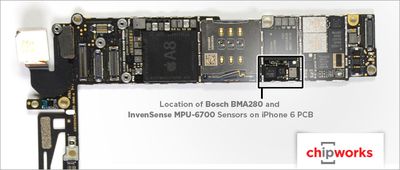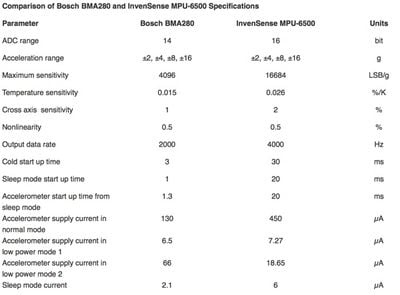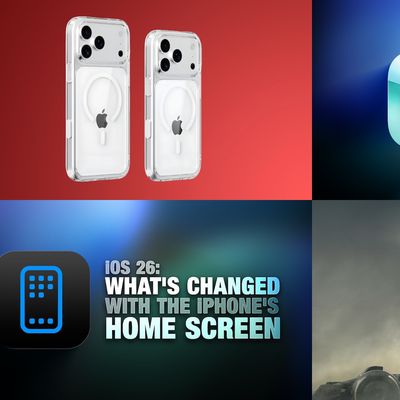Apple has opted to equip the iPhone 6 and 6 Plus with two separate accelerometers, as discovered in Chipworks' comprehensive iPhone 6 and 6 Plus teardown. There's a three-axis Bosch BMA280 accelerometer and what Chipworks believes is a MPU-6700 six-axis accelerometer from InvenSense.
According to Chipworks, Apple may have decided to incorporate two accelerometers into the iPhone 6 and 6 Plus to both minimize power consumption and "improve the overall user experience."
The InvenSense accelerometer has a range of functions, allowing it to operate in several different modes, but it can draw more power than the Bosch accelerometer due to its higher sensitivity. The maximum sensitivity of the InvenSense is at 16684 LSB/g, much higher than the Bosch's 4096.

The InvenSense device can operate as a six axis inertial sensor, or as either a three-axis gyroscope or a three-axis accelerometer. It is rated to consume 3.4 mA in the six-axis mode, 3.2 mA in the gyroscope mode and 450 µA in the accelerometer normal mode. By contrast, the Bosch device operates as a 3-axis accelerometer only and it consumes 130 µA of current in the accelerometer normal mode. Both devices offer two low power levels of operation for the accelerometer function. The InvenSense device actually consumes less current in its lowest power mode, with a 1 Hz update rate.
The main benefit of the InvenSense is full six-axis integration of the data by the on-chip digital motion processor (DMP). This will provide a direct benefit for gaming and other applications that need sophisticated inertial sensing capabilities. In addition the InvenSense provides significantly higher sensitivity than the Bosch device. The price however, is higher power consumption.
The Bosch accelerometer is able to operate at a lower power than the InvenSense and it has a "much faster" cold start up time, at 3ms compared to 30ms, allowing it to be used when complete six-axis integration is unnecessary. Chipworks speculates that it may be used for tasks where higher sensitivity is unneeded, perhaps for rotating the screen from landscape to portrait mode or for pedometer functionality.

According to Chipworks, the inclusion of two accelerometers in the iPhone 6 and 6 Plus is an example of Apple's "elegant engineering." A single InvenSense accelerometer would have enabled the device to work perfectly well, but the addition of the Bosch accelerometer allows for lower power consumption in the appropriate situations.


















